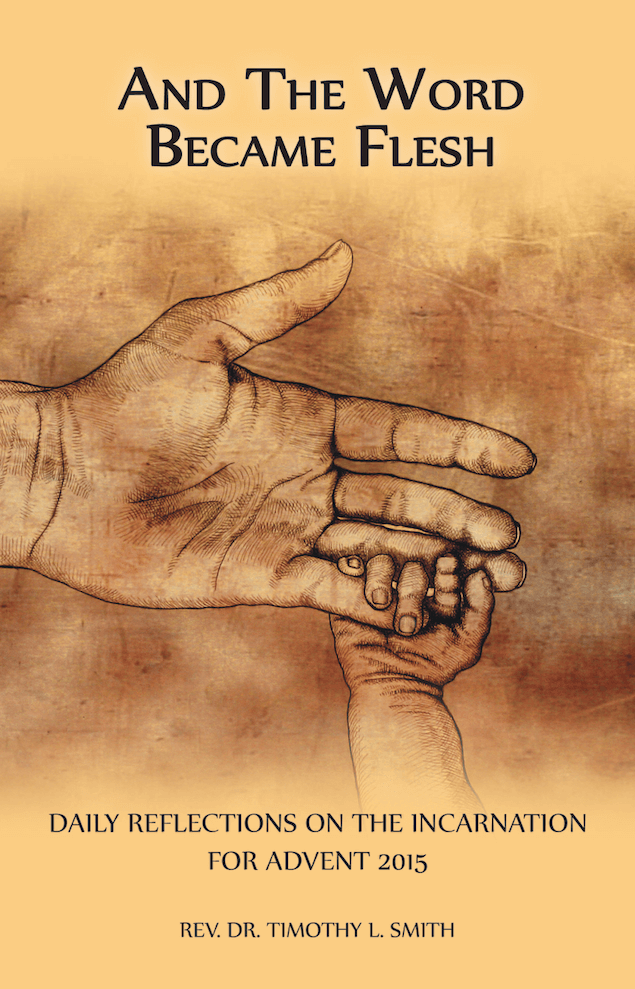The Twenty-Fifth Day of Advent
Then he took a loaf of bread, and when he had given thanks, he broke it and gave it to them, saying, “This is my body, which is given for you. Do this in remembrance of me.” And he did the same with the cup after supper, saying, “This cup that is poured out for you is the new covenant in my blood.”
Luke 22:19-20
I was a young seminarian who thought of the life of faith as very spiritual; I didn’t know what to make of the words of William Temple, the Archbishop of Canterbury. He said, “Christianity is the most avowedly materialistic of all the great religions.” (William Temple, Nature, Man and God) I wasn’t sure what the material had to do with the Christian faith. Yet I knew that God created the material world and called it “good”, and even created Adam out of the dust of the ground and Eve out of Adam’s rib. God took matter to Himself forever, sending His Son in human flesh to redeem and restore His material creation. I had to admit that the Bible never hints at escaping the material world in order to be spiritual. Rather, it was first century gnostic heretics who could not imagine God becoming flesh and living with us.
Thomas Howard describes the materiality of God’s redemption story and the first Christmas:
First a pregnancy, then a birth. Obstetrics and gynecology, right at the center of redemption. Fasting in the wilderness, water to wine, a crown of thorns, splinters, and nails and blood – our eternal salvation carried out in grotesquely physical terms. Then pure spirituality, right? Wrong! A corpse resuscitated. And not only that, a human body taken up into the midmost mysteries of the eternal Trinity. And bread and wine, body and blood, pledged and given to the church, for as long as history lasts. (Thomas Howard and Vivian Dudro, “The Night is Far Spent: A Treasury of Thomas Howard)
Jesus does not hesitate in using material things or employing them in Kingdom work. His first miracle was changing water into wine for wedding revelers (John 2:1-11). He used His spit for healing (John 9:6), and reached out His hand to cure (Matthew 8:3). The Incarnation started changing the way I thought about God and how He goes about His work.
Dallas Willard highlights the role of the body in the spiritual life in his book, The Spirit of the Disciplines:
The human body is the focal point of human existence. Jesus had one. We have one. Without the body in its proper place, the pieces of the puzzle of new life in Christ do not realistically fit together, and the idea of following him and becoming like him remains a practical impossibility…The vitality and power of Christianity is lost when we fail to integrate our bodies into its practice by intelligent, conscious choice and steadfast intent.
Thus, the apostle Paul exhorts us to present our “bodies as a living sacrifice, holy and acceptable to God” as an act of “spiritual worship” (Romans 12:1).Dallas Willard sets forth classic spiritual practices such as solitude, silence, fasting, service, and prayer, as ways we present our bodies to God and nurture the spiritual life.
I had not noticed until recently how the Incarnation plays out in the celebration of the Lord’s Supper. It is all so very material. Jesus takes bread, breaks it, gives thanks and says, “This is my body.” He pours wine and says that it is “the new covenant in my blood.” He does not tell us to think about it, or study it, but to eat it and drink it.
C. S. Lewis observes that Christianity is spread “not only by purely mental acts like belief, but by bodily acts like baptism and Holy Communion…God never meant man to be purely a spiritual creature. That is why He uses material things like bread and wine to put the new life into us.” (C. S. Lewis, Mere Christianity)
I’m learning that matter matters to God!
PONDERINGS
- Has today’s reading changed your thinking about your body? If so, how?
- What are some material actions or material things that could help nurture your faith?
- Do you see the need to do more to incorporate the body into your faith? If so, what more could you do?
EMBODIED PRAYER: FACE DOWN
In the Bible we frequently see intense prayer expressed as people fall on their faces before God. It is an outward sign of reverence to lie with face to the ground in God’s presence. By this we acknowledge His complete sovereignty and right to rule in our lives.
When God made an everlasting covenant with Abraham, Abraham “fell on his face” before the Lord (Genesis 17:3). When Joshua faced great enemies he “fell on his face” in God’s presence until the evening (Joshua 7:6). When a leper desperately seeking healing came to Jesus “he bowed with his face to the ground and begged him” (Luke 5:12). In the Garden of Gethsemane Jesus “threw himself on the ground and prayed” (Matthew 26:39). Heaven’s angels fall on their faces before God’s throne and worship Him (Revelation 7:11). Praying face down before God is a Biblical expression of reverence to God and submission to His omnipotence and wisdom.
Today and every day of the fourth week of Advent pray the Lord’s Prayer with your face to the ground in God’s presence.




